"Have you tried not being a mutant?"
The setting is the modestly decorated living room of a two-story suburban house somewhere in Boston. A teenage boy sits on a couch facing his mother, father, and younger brother, the latter of whom refuses to make eye contact with him. Also present are a couple of the boy's classmates and one of his teachers, though exactly what he's a teacher of is a total mystery given his bizarre hairstyle and unprofessional appearance. (Just blue jeans and a white T-shirt? What is he, Bruce Springsteen?). The weight of what the boy just revealed to his family is still washing over the entire room. He's been lying to them about who he truly is this entire time. Today, however, that changed. Today, he finally came out: he's gay.
Wait. Scratch that. Sorry. Been awhile since I've seen the movie. Let me try that again:
Today, he finally came out: he's a mutant.Yep, that's the ticket. That's what actually happens.
I am describing one of the more memorable scenes from Bryan Singer's X2: X-Men United: Bobby Drake, Rogue, Pyro, and Wolverine stop off at Bobby's house to lay low post-X-Men mansion attack. When Bobby's family shows up, he chooses to come clean rather than continue lying to them. It doesn't go well. His brother darts away to secretly call the cops on them while his moms say things like "It's all my fault" before going straight into denial, thus the infamous "Have you tried not being a mutant?" line.
The metaphorical message of the scene is blatantly obvious: Bobby is "coming out" to his parents, and they ultimately reject him, driving him to take solace in a fellow group of outsiders he considers his adopted family. This new family just also happen to wear latex suits and war against bigoted government types as well as violent revolutionaries who emerge from within their own ranks, but, hey, every family has its issues, amirite?
Context matters here. X2 was released in the summer of 2003. The Clinton Administration's "Don't Ask, Don't Tell" policy wouldn't be repealed for another 7 years. Pop culture's gradual embrace of gay characters and storylines was processing forward - in '92, Northstar became the first Marvel superhero to come out as gay, Ellen aired its big coming out episode in '97, Will & Grace debuted in '98, Queer as Folk in 2000. Queer Eye for the Straight Guy was still two months away from its debut.
With the openly gay - er, actually bisexual and now alleged predator - Singer at the helm and openly gay Ian McKellan in the cast, X2 was a perfect vehicle to advance the cause forward. The idea, however, didn't stem from the expected sources. Instead, it came from screenwriters Michael Daugherty and Dan Harris, two relative newbies hired to heavily rewrite a screenplay from X-Men 's David Hayter.
In the script they inherited, Bobby's parents already know he's a mutant but do not approve, with their shaming of him being thorough enough to cause him to run away and find his way to Xavier's school. So, reuniting with them is an incredibly tense moment. Daugherty and Harris jumped on the possibility to change this into a coming out scene.
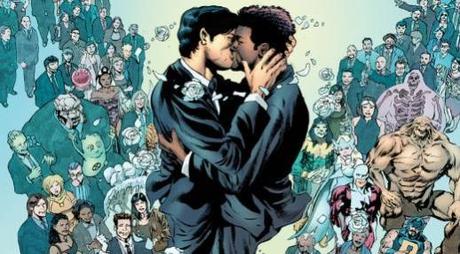
It was a natural choice for any X-Men movie to make. From their very beginning in the comics, the X-Men have been used to metaphorically speak to a wide variety of issues. The civil rights struggle which informed the X-Men's creation broadened over time to encompass all outsider groups. As Chris Claremont put it, "What we have here, intended or not, is a book that is about racism, bigotry, and prejudice...it's a book about outsiders, which is something that any teenager can identify with."
Always through metaphor, though. That's how Fox allowed a big summer blockbuster superhero movie to include a coming out scene: if the boy coming out of the closet does so while sitting next to his girlfriend mere minutes after they kissed. He can be metaphorically gay, but not literally gay.
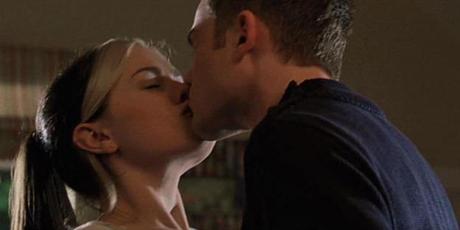
It's 16 years later. Fox, for all intents and purposes, doesn't even exist anymore. It's now just one of Disney's many brand extensions, and two of Disney's employees just made some pretty big noise about the possibility of a true, non-metaphorical coming out scene coming to the Marvel Cinematic Universe.
Talking to EW Morning Live, Avengers: Endgame directors Joe and Anthony Russo yet again discussed their film's rather casual introduction of a gay character - played by Joe - and then possibly said more than they were supposed to:
[Host Dalton] Ross asked to clarify if it truly was the first out gay character in a Marvel film - and that's when things got revealing.
"Yes, openly gay," Joe emphasized. "There've been insinuations about other characters' sexuality, but this is the first openly gay character."
"Who else is gay?" [co-host Jessica] Shaw asked.
"Uhhh," Joe said, perhaps realizing he opened a door he shouldn't have. "We're gonna find out!"
"That's a story for another day," Anthony said.
The internet's natural response is to wildly guess who the secretly gay character might be - Captain Marvel? Winter Soldier? Falcon? Wong? Shuri? Maria Hill? That one guy who was playing Galaga in Avengers?
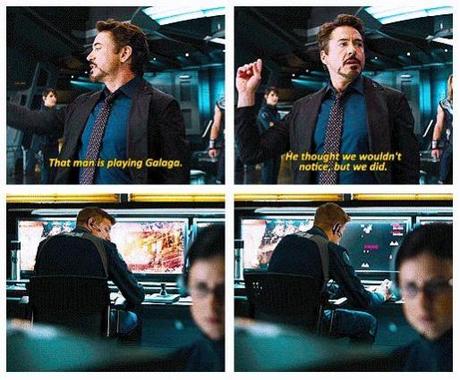
But what actually happens next? As EW surmised, "Last summer, Marvel Studios President Kevin Feige said two openly gay characters would be revealed: "Both ones you've seen and ones you haven't seen." If Joe Russo's character is the one we hadn't seen before, the question remains who among the characters we know will come out."
Does this mean we are heading toward a coming out moment in an upcoming Marvel movie or Disney+ series? Or, more likely, will such a storyline be introduced as casually as Joe Russo's gay Mets fan is in Endgame, leaving the coming out theatrics of X2 far behind?
Obviously, only time will tell, but in the here and now I am reminded of Jackson McHenry's Vulture essay in which he described his exhausted reaction to Marvel's self-congratulation:
It's exhausting to have to cling to a minor step toward depicting the world as it is 22-episodes - I mean, movies - into a multi-billion dollar franchise. It's exhausting to watch a movie pat itself on its back in a battle scene by having all the female heroes band to together for a big moment while knowing that most of them are secondary to the male characters in their respective movie plots. It's exhausting to celebrate that steps are being made. It's exhausting to cheer on the fact that changes are coming. It's exhausting to feel obligated to say thank you to the gigantic corporate monolith even as it swallows smaller corporations.
I'd add to that "it's exhausting to have to be told after the fact someone in a movie is gay when box office concerns prevent that from ever being spelled out on-screen." See Robin Wright's female love interest in Wonder Woman or Tessa Thompson's bisexuality in Thor: Ragnarok. Wait. You can't because neither of those things made it to the final cut.
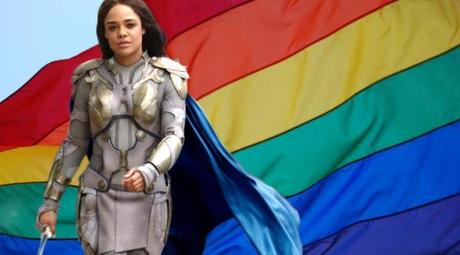
However, what else can you do in a world in which China is the #2 - soon to be #1 - market for film and it recently banned all depictions of gay characters TV and cut all of the gay scenes out of Bohemian Rhapsody?
It's a business, not a civil rights organization, and in the business of selling tickets, it's revolutionary when Star Trek's Sulu gets to hug a husband and walk into the distance with their adopted daughter even though that specific moment and those characters enact no meaningful impact on Star Trek: Beyond's story. It's similarly supposed to elicit applause when Jude Law's Dumbledore has his prior romantic relationship with Johnny Depp's Grindelwald vaguely alluded to in the latest Fantastic Beasts and Where to Find Them.
There's a term for this. It's called queerbaiting, and it's frustrating as hell. As Vanity Fair explained:
This approach speaks to a frustrating trend in blockbuster movies, one exemplified by recent films like Power Rangers and Beauty and the Beast. Both movies made headlines by teasing storylines involving explicitly gay characters-or, in the case of Beauty and the Beast, an " exclusively gay moment." When the movies actually made it to theaters, though, those much-touted scenes amounted to little more than throwaway moments that felt divorced from the rest of the story-blink-and-you'll-miss-it fragments, rather than true examples of much-needed L.G.B.T. representation. There's something cynical about explicitly telling L.G.B.T. fans to look out for L.G.B.T. characters-then responding to their attention (and ticket purchases) with weak feints at inclusion, or nothing at all.
Joe and Anthony Russo, whether they intended to or not, are perilously close to falling into this trend. There better be some actual follow through on this. Otherwise,the lesson of X2 will prevail: the only concrete way to tell LGBTQ stories in blockbuster movies is through metaphor. From the days of The Twilight Zone, metaphor has always been the path of least resistance when attempting to speak to social issues. Maybe that's still true. However, X2 seems like it happened ages ago. Are Marvel movies ready to take the next step?
That's why genre fans looking for LGBTQ representation have likely already and long since turned to TV. Thank the Lord for The Magicians, Wynonna Earp, Killjoys, Star Trek: Discovery, Supergirl, Legends of Tomorrow, The Expanse, and Sense8, to name a few.
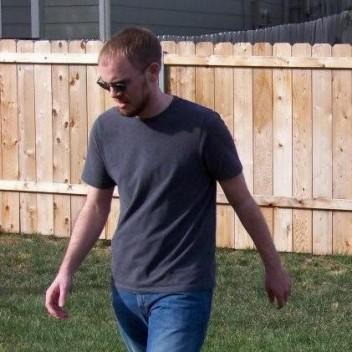
Grew up obsessing over movies and TV shows. Worked in a video store. Minored in film at college because my college didn't offer a film major. Worked in academia for a while. Have been freelance writing and running this blog since 2013. View all posts by Kelly Konda

